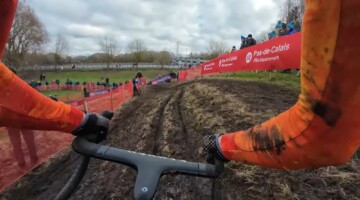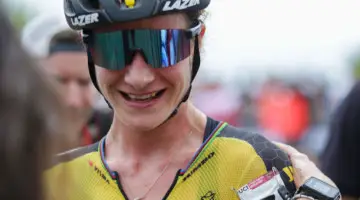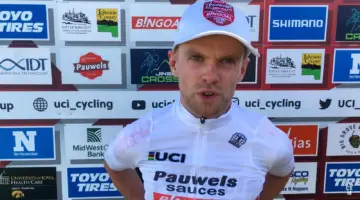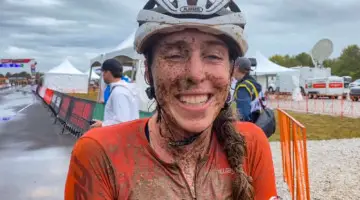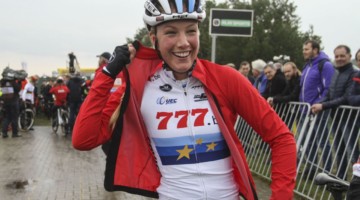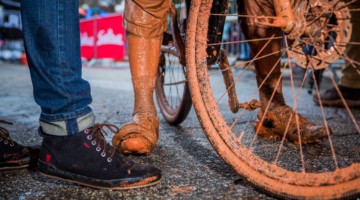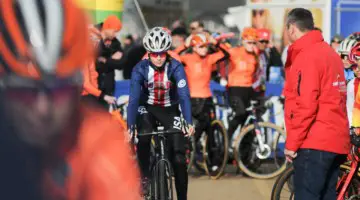Hannah Finchamp has been busy this summer mountain biking across the U.S. and Europe. The Clif Pro Team and Lindenwood University rider finished second at the Women’s U23 Mountain Bike Nationals last month and has competed in the U23 category at several of the mountain bike World Cups. Finchamp is also an accomplished cyclocross rider who won the Collegiate Varsity race at the 2017 Hartford Nationals and finished third in the Women’s U23 race.
I reached out to Hannah to talk about her busy summer and learn more about her blogging at hannahfinchamp.com. After her career in cycling is over, she may have a position waiting at Cyclocross Magazine.
Read excerpts from our conversation about mountain biking, blogging, triathlons and rapping or download the audio to help pass the time during your morning commute or afternoon trainer session.
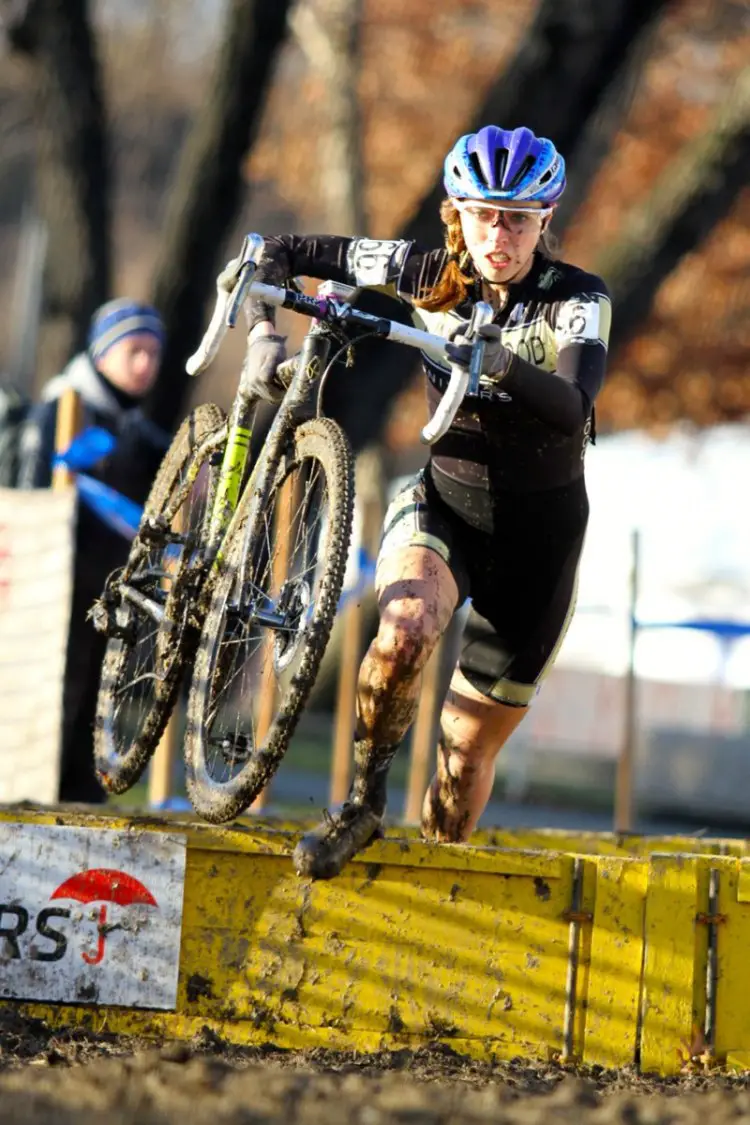
Hannah Finchamp has shown resilience in the face of hurdles during the past year. 2017 Cyclocross National Championships, Women’s Collegiate Varsity Race. © D. Mable / Cyclocross Magazine
Cyclocross Magazine Conversation with Hannah Finchamp
Cyclocross Magazine: It looks like you’ve been pretty busy on the mountain bike this summer, how’s that been going?
Hannah Finchamp: It’s been really great. I’ve gotten to experience some new things this summer like going over to Europe to race the World Cups. I can’t really say anything but good things about all the things I have gotten to do.
CXM: What’s that experience been like, doing the World Cups in Europe?
HF: You know, it was really different in the best possible way. That was definitely a goal I set for myself this season, to be able to go over to Europe to race. For me, it really showed how far I’ve come, how far I have to go and what this sport has to really offer.
CXM: By what the sport has to offer do you mean both the competition and the courses? I know watching some of those on Red Bull TV, they looked pretty gnarly, huh?
HF: Definitely. The courses are very different on the World Cup circuit, but it is really everything. The competition, the courses and for me, seeing the spectacle of it all was really really exciting because it’s not a small operation. This is a huge endeavor that all these athletes and Red Bull and everything make into something big. It’s really cool to see how huge the sport really is.
CXM: It’s not quite the same as cyclocross. You go to Europe for cyclocross and it’s winter, it’s in Belgium. Were there any good stories that stand out in your mind? Where did you race?
HF: This summer in Europe the two places I raced were Andorra and Switzerland, and while it could have been very simple, both of those races, as well as Mont Sainte-Anne in Canada, it rained the entire night before the race for us. I think that’s a little more common in Europe than it is in the U.S., but that was really exciting to get to have the slick and wet conditions, especially for us U23 women who were the first people on the course the next day.
CXM: How do you prepare for that? You’re not really supposed to be riding mountain bike trails when they’re muddy, right?
HF: I think a lot of it comes down to experience. You race in any conditions, and we see that in cyclocross more than anything. A lot of it is just being mentally prepared. When I saw on the forecast that there was weather coming, I just decided, okay, the course is going to be wet, and kind of no matter how I actually felt about that, I told myself this is great for me and kind of just went with that attitude.
CXM: Were you successful in talking yourself into it?
HF: Yeah, I think I was, and I think a lot of that does come from cyclocross. I had a lot of friends and support saying, “Come on, you’re a cyclocross racer, you know what it’s like to race in the mud and wet conditions.” And just kind of hearing that over and over, you start to think, you know what, I do.
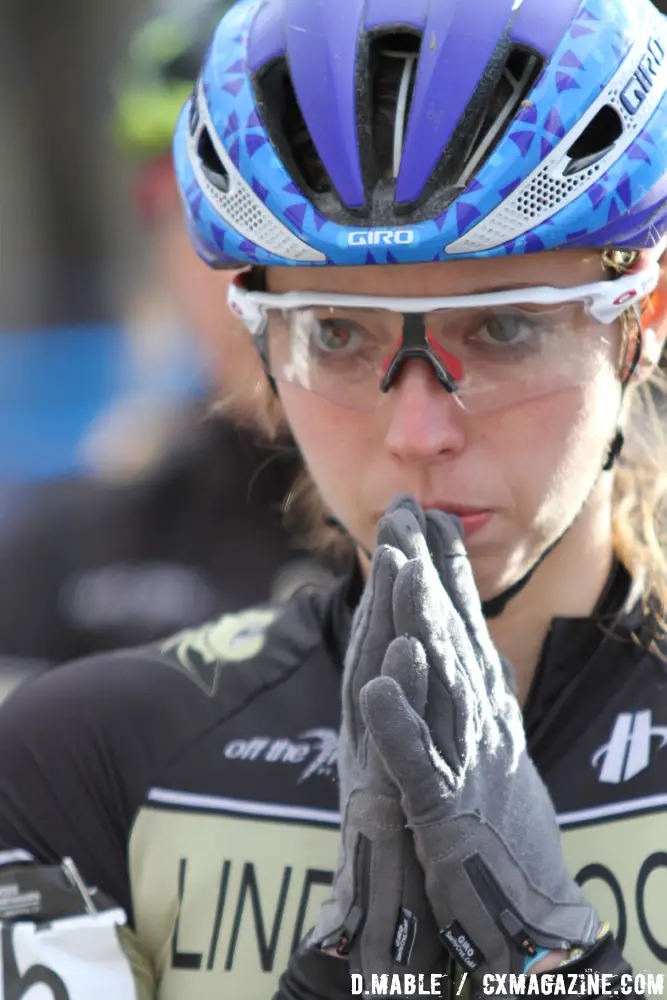
Hannah Finchamp’s focus has helped her succeed in a variety of conditions. 2017 Cyclocross National Championships, Women’s Collegiate Varsity Race. © D. Mable / Cyclocross Magazine
CXM: At U.S. Nationals you did quite well. Did you get to race on one of the days when it was really rainy and gross there?
HF: Yeah, it wasn’t raining during our race per se, but it rained all the way up to the hour before, so we got really fun, exciting conditions out there. For West Virginia, it made the course better because of all the roots and all that stuff, it’s exciting when it’s wet. It’s not just racing through mud puddles, it’s racing on the slick roots and it really exaggerates the bike handling skills you have to have.
CXM: How did U.S. Nationals compare to what you experienced in Europe at the World Cups?
HF: The World Cups are definitely a lot bigger, so start position and the start of the race is a lot bigger of a focus. In terms of the courses, a lot of people out there were saying, “Oh my gosh, we’re just racing in Lenzerheide,” which was one of the World Cups I did, so it really did a good job of showcasing what the U.S. has to offer in terms of difficult and European terrain.
CXM: How long have you been mountain biking?
HF: That’s actually a great question because I started racing triathlons competitively when I was nine, so I’ve been in sport for a long time. I raced the XTERRA world championships, I won that two times, and that’s actually how I got on Clif five years ago. They took me on as a triathlete, and after three years on the team, they said, “You know, we think we see a future with you in mountain biking.” I officially transitioned completely to mountain biking. The short answer to that question is I have been mountain biking now for three years, but I’ve been competing for a really long time.
CXM: Wow, so just three years and you’ve already finished second at Nationals twice, you’ve made the World Cup team. That’s pretty impressive.
HF: Thank you. I am really happy with how the whole transition has gone for me. I love the sport so much, I am so grateful that Clif encouraged me to make that transition because it wasn’t easy to step away from something I was comfortable in and move to more of an unknown area, but I would say I definitely feel comfortable on the mountain bike now.
CXM: So how did that work though? They said, hey you’re used to riding on the road with what, five meters between you and the next rider, we think you would be good at mountain biking? Is that how it worked?
HF: I did do both on-road draft-legal triathlons, the Olympic-style racing, and I also did XTERRA off-road, and that’s what I was recruited for, the off-road triathlon. At that time, Clif, which was then Luna, had an XTERRA team, so I was used to riding mountain bikes but on very different types of terrain. Also, my biggest thing was when you get out of the swim, it’s already spread out. Now, you all start together, so these past three years a huge thing I’ve focused on is the first three minutes of the race and trying to get forward as quickly as possible.
CXM: That seems like a good point. You wouldn’t maybe imagine with a mountain bike race, it’s a spread-out two-hour race, but you still have the cyclocross-style start.
HF: Absolutely. That actually was a mantra of mine at the World Cups this year, be aggressive like ’cross. Because in ’cross, that’s just kind of what it is, you start and you have to own your space. It’s your space and no one comes in. You don’t have to have that attitude as much in the U.S. races because they tend to be smaller fields, but in Europe, you definitely have to own your space because if you don’t someone is going to take it from you.
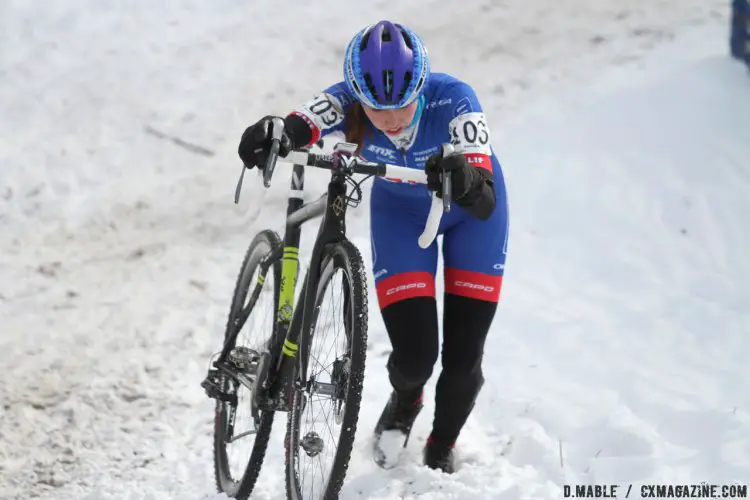
Hannah Finchamp’s background in triathlons has made her very comfortable with the running aspect of cyclocross. 2017 Cyclocross National Championships, Women U23. © D. Mable / Cyclocross Magazine
CXM: I guess since you have the history in triathlons, that really begs two questions. One, you’ve got to be pretty good at running in cyclocross, do you still have that running ability and do you train that?
HF: I do still have that running ability. I guess I do train it, but it seems like so much less since I’m not running full time. I actually ran in college for the first two years, and now I’m a fourth year, so not that long ago I was still competing in cross country. I would say running is a huge advantage for me in a ’cross race. Whenever we’re all running, I feel pretty confident I can take anyone on.
CXM: Obviously the second question is, do people ever try giving you a hard time about your triathlon background?
HF: Absolutely. It’s funny because the cycling and triathlon communities do have such an interesting relationship, that I have kind of had to shed that “triathlete” sense from myself. I think that at this point people are starting to see me more as a mountain biker, which I have been very happy about.
CXM: You mentioned college, you’re racing for one of the varsity programs at Lindenwood, how has that experience been and how has it benefitted you as a cyclist?
HF: It’s been a really great experience. Like I said, I came into college as a triathlete. My freshman year in college I swam on the swim team, I ran on the cross country and track team and I rode for the cycling team. *laughs* After that experience, along with the encouragement from Clif, it just became so clear mountain biking is where my heart is. That was the practice I was always the most excited to go to. I think college helped me cement a lot of the love for riding, and then as it got more serious and competitive and harder, the love foundation was already there, and now it’s fun to go harder.
CXM: It sounds like a good choice instead of staring at the black line on the bottom of a swimming pool. You get to see some much prettier scenery huh?
HF: 100 percent, yep.
CXM: What else has Lindenwood been able to provide to help you develop as an athlete?
HF: A lot of being on the collegiate cycling team for me, because I do have Clif backing me, is learning how to support myself while also supporting others. When you’re on a professional team, everything is taken care of for you, but when you’re on a collegiate team, the college, of course, takes care of its athletes, there’s a lot of camaraderie because we’re all in this together. When we go on a group ride and someone gets a flat or has a mechanical, it’s kind of everyone’s job to help figure it out. In many ways, I think collegiate cycling has made me a lot more self-sufficient, just because it encourages people to take care of each other.
CXM: You’re from Washington, correct?
HF: I’m originally from California. That’s where I came from to go to Missouri, but recently I’ve moved to Washington.
CXM: Was that a hard transition from being, I guess a California Girl, as it were, to Missouri.
HF: It actually was a difficult transition. I think in the end it benefitted me because growing up, a lot of my training was run up or ride up the mountain and then at the end of the ride you ride down. But in Missouri, there aren’t huge mountains to climb, it’s a lot more rolling and twisty terrain, so it forced me to focus on a lot more different abilities I hadn’t cultivated before. I think I’ve definitely benefitted from it, but I’m definitely excited to move back to some mountains.
CXM: What are you studying?
HF: I’m a double major in athletic training and exercise science.
CXM: Is there one part of that you’re particularly interested in?
HF: I really enjoy the athletic training aspect, being able to evaluate, prevent and provide therapy for injuries. That’s something I’m really passionate about, so maybe when I retire from racing I can help other athletes. But I also got the exercise science degree because I’m very interested in coaching, if not later, in the near future while I continue my career.
CXM: You got your first national championship, I believe, you can correct me if I’m wrong, in cyclocross in Hartford, correct?
HF: In collegiate, yes.
CXM: The way it kind of played out says a lot about your mental preparation. Were you worried at all, you had a mechanical and stayed strong and came back and won. Did your preparation pay off there?
HF: I think so. Well, a few things. One, my running definitely helped me keep calm in it because I had to run quite a way to the pit. Also, there was a second when I had the mechanical, and of course that thought creeps into your mind of, oh my gosh, this is it. But it’s a matter of pushing that out as quick as possible.
Sometimes I’ll even write my story while I’m racing, you know a race report, when you type it up on the computer. I will almost write it in my head, and I’ll write it the way I want it to go. As I’m running to the pit I’m thinking, “Finchamp comes back for the win.” Small things like that that I place in my mind and tell myself, this is possible. These are the things that can happen, and I think once you see the possibility it’s so much easier to execute it and make it happen.
CXM: Maybe down the road you can have my job. You have a very nice blog, how did you get into writing about bike racing?
HF: I’ve always loved writing. It’s always been something I’ve done in my spare time. It’s how I’ve been able to express myself the easiest. I write a lot of poetry, I write a lot of things with colorful adjectives, and I think I’m at a point in my career where I want people to know the person behind the bars. I decided I needed to start writing on my website and on a blog to let people know, you know, sometimes you don’t know what the racers are like out there, so I’d like to give people a little window into my thoughts.
“I’ve always loved writing. It’s always been something I’ve done in my spare time. It’s how I’ve been able to express myself the easiest.”
CXM: Do you ever talk to any of the other athletes who blog about racing? Do you ever share pointers?
HF: I don’t think we really share pointers, but I do think it is so fun to go back and read blogs, especially from the same races you’ve done. Even when you’re competing right next to someone, if you can read that person’s blog, it’s so cool to see a different point of view because sometimes you’re racing and you’re feeling like you’re strung out and getting dropped, and you read a blog from the person next to you and they’re saying, “Oh my gosh, I was dying.” Then you realize, there’s so much going on on the bike that you have no idea about because you can’t read the person’s mind in that moment.
You’d be surprised how often they almost contrast each other about the same event. It’s really interesting.
CXM: You started as a mountain biker, how did you start racing cyclocross? When did that happen?
HF: I actually started cyclocross before mountain biking just for fun at a local series, the Prestige series that Dorothy Wong puts on. I showed up at a bike shop one day and they were having a clinic and there were people racing in the snow. I was maybe 11, and I said, “Oh my gosh, racing bikes in snow, I have to try that.” My first Nationals was the one in Bend a while ago, and other than that, other than Nationals I mostly did local things until a few years ago when I started taking mountain biking seriously. ’Cross was a natural add-on for me.
CXM: It looks like now you’ve been doing the circuit of the big UCI races in the Midwest. Is that going to happen again this year?
HF: Yeah, that is definitely the goal since I go to school in Missouri, it’s easiest for me to hit the UCI races in the Midwest. I will kick off the season at CrossVegas this year, which I am really excited about. Other than that, I just have the championship races on the calendar, but I will be filling it in with other UCI races when I can.
CXM: Speaking of your blog, I saw that earlier this year you had an accident with a car?
HF: Yeah, it was in May, so it hasn’t been that long.
CXM: What happened?
HF: It just seemed like your typical, I went to make a left turn and for whatever reason, the driver behind me was distracted and did not stop for the left turn. She was coming from behind me and not in front of me, so she actually hit me from behind. I got lifted up onto the windshield and rode her windshield for, I was knocked out, but according to witnesses it was about 100 yards before she was able to hit the brakes. It was a very traumatic experience for sure, but I’m really happy that the season has turned out the way it has. I would not have imagined that in May.
CXM: Oh my gosh, I’m so sorry. That sounds like every cyclist’s worst nightmare.
HF: Yeah, that’s really a good way to describe it. It kind of seemed like the typical cyclist’s nightmare of getting mauled by a car, but I was so lucky. I got knocked out and I got a concussion, but other than that, I walked away with very minor scrapes, so I think God was looking out for me. In the end, it gave me better perspective once I was able to get over the trauma of it. I’ve gotten to a place where on those really hard days or days that I’m just not feeling it, I kind of remember that moment where I felt like it was almost taken away from me and I can ride with so much joy, just remembering, hey, I’m riding. I’m able to ride. I think it’s really important to not lost that perspective.
“I’ve gotten to a place where on those really hard days or days that I’m just not feeling it, I kind of remember that moment where I felt like it was almost taken away from me and I can ride with so much joy, just remembering, hey, I’m riding. I’m able to ride.”
CXM: So last question, at Nationals during one of your races, I heard someone shouting “Go Champ,” to you. Is “Champ” your nickname?
HF: No, I don’t know who that could have been actually. It’s a cool nickname since my last name is Finchamp. I like it, but I actually haven’t heard it before.
CXM: Maybe I was just imagining things. I was going to ask if that is your nickname if it created an extra amount of pressure growing up, but I guess not.
HF: Growing up, I think my only nickname would have “Rae Rae,” so not quite as exciting as “Champ.”
CXM: Do you still have a nickname or anything you go by?
HF: No, not really other than with Clif, I’m sure you’ve heard we all have our rap names this season, and obviously we’ve taken those pretty seriously.
CXM: I actually didn’t hear about this. Maghalie didn’t bring this up. Can you please share?
HF: Well at the beginning of the season when we did our photo camp all of us Clif women sat down and we wrote a rap. I’m sure it’s somewhere out there for you to be able to find because we performed it at Clif Bar and Sea Otter. You can’t perform a rap without having rap names, so we all have our own individual rap names.
CXM: Can you share? Or do I have to watch the video? What’s Katerina Nash’s rap name?
HF: She’s “Mysterious Mystique aka Missy K Fang.”
CXM: Oh wow. And yours, if you’re willing to share?
HF: I’m “H-Spin,” Maghalie is “Magh-Dog,” Haley [Batten] is “Lil’ Spice,” Catherine [Pendrel] is “Quick C,” Lea [Davison] is “L-Diggety,” Eva [Lechner] is “Notorious E V” and Andrea [Waldis] is “Doctor Dre.”
CXM: I like the last one. That one works on many levels.
HF: It makes sense.
CXM: I hope my editor doesn’t get upset with me if I try sneaking these into race reports this year.
HF: Oh no, you have to. Haley, on her National Champion jersey, it says “Lil’ Spice.” These are definitely out there for you to use.
CXM: Well sweet. Thank you so much for taking the time to chat with me. I really appreciate it.
HF: Thank you. It was really fun.
Check out all our Cyclocross Magazine interviews and listen to our growing collection of audio conversations.


